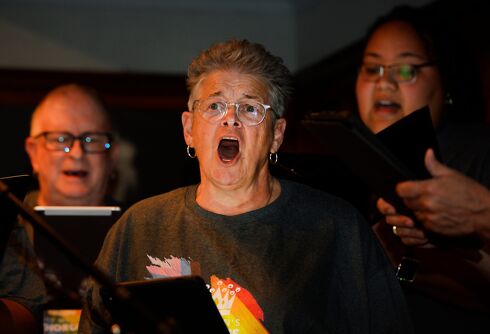Six Wyoming sorority sisters sued the national chapter and a transgender student in a ridiculous attempt to force the student out of the local chapter of Kappa Kappa Gamma. The group of mean girls launched vicious and dehumanizing attacks against their fellow sister, Artemis Langford, in court papers.
While the women tried to keep their identities a secret, the judge refused the request and publicly schooled Jaylyn Westenbroek, Hannah Holtmeier, Allison Coghan, Grace Choate, Madeline Ramar, and Megan Kosar for their asinine lawsuit.
Related:
Two women kissed in front of an anti-gay Trump supporter & now they’ve gone viral
“This dude was homophobic and a Trump supporter so you know we had to do it to him.”
The judge noted that the lawsuit was so basic that the women didn’t even lay out any logical reasoning for their case. Instead, Judge Alan B. Johnson pointed out that most of the paperwork submitted by the sisters was nothing more than personal smears.
Stay connected to your community
Connect with the issues and events that impact your community at home and beyond by subscribing to our newsletter.
“If Plaintiffs wish to amend their complaint, the Court advises Plaintiffs that they devote more than 6% of their complaint to their legal claims against Defendants,” he advised in the ruling. The consistent misgendering and transphobic insinuations were so heinous, he noted, that he refused to recount them in the decision.
Johnson repeatedly dismissed every one of the six sisters’ reasons for bringing the lawsuit, noting that being told they could always leave the not-for-profit organization they willingly joined was not cause for claiming damages. He also pointed out that the council of local sisters had deliberately invited Lanford to join the group.
Moreover, the national chapter is located in Ohio, making it the wrong court to file a lawsuit in. Demanding that the judge haul Kappa Kappa Gamma employees from Ohio to Wyoming to answer spurious charges that assume that the group isn’t allowed to set its own membership criteria was nonsensical, he pointed out.
The sorority can dictate the terms of its membership under the constitutional right to free association. The sorority said it can evolve along with the definition of “woman,” which they said is a more “inclusive” description now than when the sorority was founded 150 years ago.

















